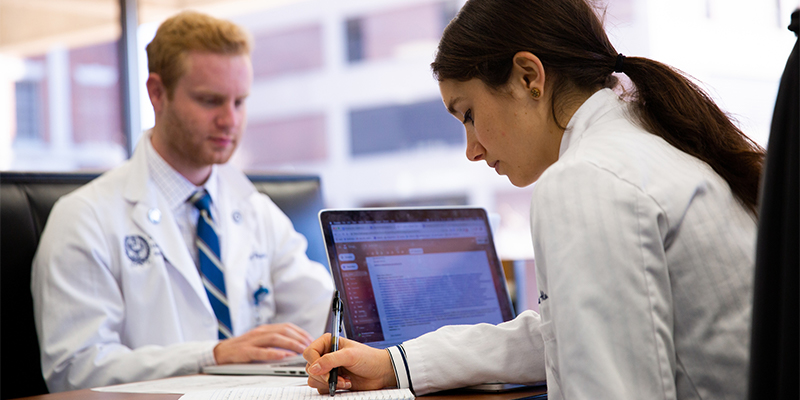Curriculum

Academic Calendar
Mission Statement
Guided by the Jesuit tradition of Cura Personalis, care of the whole person, Georgetown University School of Medicine will educate a diverse student body, in an integrated way, to become knowledgeable, ethical, skillful, and compassionate physicians and biomedical scientists who are dedicated to the care of others and health needs of our society.
Medical Education Competencies
In January 2016, Georgetown University School of Medicine faculty met and confirmed that all graduates from the School of Medicine M.D. program would meet nineteen competencies within three domains: Knowledge, Skill, and Values & Attitudes. All modules, courses, and clerkships contribute to the attainment of these important objectives.
Graduates of Georgetown University School of Medicine will demonstrate the following competencies:
Knowledge-Related Competencies:
- Acquire, integrate, and apply knowledge of biomedical science to the care of patients.
- Demonstrate intellectual curiosity and a commitment to learning, critically evaluate new knowledge and determine its relevance to the clinical problems of individual patients.
- Apply principles of epidemiological sciences to implement strategies to prevent disease and promote the health of patients and populations.
- Demonstrate an understanding of the psychological, socioeconomic, cultural, and spiritual dimensions of human health and illness.
- Evaluate the current health care system and identify strategies to improve the organization, financing and delivery of safe and effective health care.
Skill-Related Competencies:
- Obtain and perform a complete, systematic, patient centered, history and physical examination integrating the scientific foundations of medicine with clinical reasoning skills.
- Integrate patient data to formulate an accurate assessment and develop a prioritized differential diagnosis, and recognize a patient who requires urgent evaluation and treatment.
- Form clinical questions, identify and evaluate appropriate information resources, and apply evidence-based principles for the benefit of individual patients.
- Select and interpret common diagnostic and screening tests, integrate and apply the results in the process of clinical problem solving and in developing and managing a safe and cost-effective treatment plan.
- Perform general clinical procedures required to provide basic patient care and inform the patient of the risks and benefits of tests and procedures.
- Present an accurate assessment of a patient encounter and document the encounter in the patient record to achieve a shared understanding of the patient’s condition with members of the health care team, patients and families.
- Participate as a contributing and integrated member of an interprofessional team and practice effective communication to assure safe transition of patient care.
- Effectively communicate with patients, their family members and caregivers and encourage them to engage in their own care, with sensitivity to patient diversity, community health influences and values.
- Educate patients, colleagues, and the community.
- Identify and report system failure and contribute to a culture of patient safety and quality improvement.
- Demonstrate independent learning and critically assess the limits of one’s knowledge, skills, and values, using a reflective process in the journey of professional identity formation.
Values and Attitudes-Related Competencies:
- Appreciate the clinical virtues and ethical dimensions of the patient-physician relationship by demonstrating integrity, excellence in care, accountability, trust, respect, compassion and humility.
- Demonstrate altruism through a commitment of service to the profession and society and advocate for all, especially the vulnerable and disenfranchised.
- Maintain personal well-being while balancing the demands of a professional work ethic and commitment to self.
